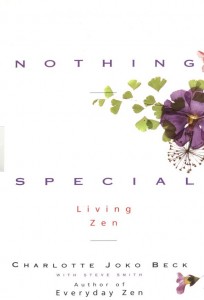“There was once a man who climbed to the top of a ten-story building and jumped off. As he passed the fifth floor on his way down, he was heard to say, ‘So far, so good!'”
– Joko Beck
Practice Meetings
Tuesday May 1, 8:30am
Friday May 4, 7:00pm
This Week’s Reading
Charlotte Joko Beck, Nothing Special, “The Fall,” p. 221.
We’ll be discussing Nothing Special until early July, then we’ll start on Thich Nhat Hanh, Old Path White Clouds: Walking in the Footsteps of the Buddha (Parallax Press, 1991). To order a copy from Amazon, click here.
This Week’s Koan
Gateless Gate, #43: “Shoushan’s Shippei”
Master Shoushan held up a shippei before his disciples and said: “You monks, if you call this a shippei, you are adhering to the fact. If you do not call this a shippei, you are opposing the fact. Tell me, you monks, what will you call it?”
Comment:
Shoushan (“Shuzan” in Japanese), b. 926
15th Generation
Lineage: Mazu > Baizhang > Huangbo > Linji > Xinghua > Nanyuan > Fengxue > Shoushan
Dharma Siblings: None of record.
Appears also in: Book of Serenity #65 and #76.
Wu-men adds: “You should not use words. You should not use no-words. Speak at once! Speak at once!”

A zen teacher with brocade rakusu and a shippei
A “shippei” is a short staff or stick, slightly curved, traditionally made from bamboo, and about half a meter long. It is the symbol of a zen master’s teaching authority, and the masters usually have it with them when they are giving instruction. Thus, when they need an object to illustrate a point, it’s common for them to reach for the shippei.
When Shoushan says, “you are adhering to the fact,” he means you are adhering to the superficial fact and negating the essence.
150 koans ago (which would have been over three years ago at our pace), we had a koan featuring Shoushan’s 4th-Great-Grandfather-in-the-Dharma, Baizhang. In that case, Gateless Gate #40, Baizhang took a water just, stood it on the floor, and said to the assembled disciples, “You may not call this a water jug. What will you call it?”
In that case, Guishan passed the test by kicking over the water jug and leaving the room. That was fine for Guishan, but if you were to do it, you’d just be copying. Without copying Guishan, how would you answer Baizhang’s challenge?
In the present case, a shippei is presented instead of a water jug. What will you call it to pass the examination?
Wu-men’s Verse (Yamada Koun translation):
Holding up a shippei
He issues the order to kill and to give life;
When adhering and opposing interweave,
Even Buddhas and patriarchs beg for their lives.
